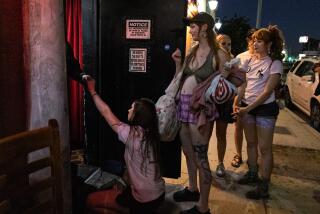Agreement Is Sought to Reopen Card Club : Casino Employees Protest Closure
- Share via
Employees of the Horseshoe Club are staging a weeklong protest outside the Gardena gambling casino to oppose its closing, while club owners and city officials seek to work out an agreement to reopen the facility, the city’s oldest card club.
Mayor Donald Dear said he has met with club General Manager Milt Corwin and prospective buyer Herbert Stern to discuss a new plan to bail out the club, which closed for remodeling on May 24 and may not reopen unless a financing plan is worked out. The city is involved in the negotiations because under state law, both the city and the state attorney general’s office must license new casino owners and check their backgrounds.
Under the new proposal, Stern, who had sought approval from the city to head a general partnership of new purchasers, would instead be general manager of the facility, City Manager Kenneth Landau said.
Remodeling of the 40-year-old casino at Rosecrans and Vermont avenues--which was halted last week pending the outcome of negotiations between Stern and the city--would resume and be paid for by the present owners, possibly through loans acquired against the property or from Stern, Landau said.
When the refurbished club is opened, Stern eventually would buy out at least 65% of the present ownership and would reapply to the city for a transfer of the operating license within four to six months, Landau said.
Landau said he will meet with Stern on Friday to review the proposal. He said that the club could open at any time under its current ownership.
At Tuesday’s City Council meeting, Dear requested that the Horseshoe Club’s latest proposal be placed on the agenda for the June 27 council meeting.
In a related issue, the council unanimously passed an urgency ordinance Tuesday requiring the city’s three card clubs to report terms and conditions of all loans, including existing loans, to the city manager within 10 days. City Atty. Michael Karger said the ordinance would help city officials ensure “that the (card club) industry is operating in a proper manner.”
“It is felt that by waiting a significant amount of time before we get the information, it may not be as accurate as we like; therefore, it is important to get it in as soon as possible,” Karger said. The ordinance was effective immediately, he said.
In action last month on the proposed Horseshoe sale, the City Council tabled a proposal from Stern and his partner, Leonard Baum, after Stern and Baum objected to conditions city officials said must be met before a license transfer is approved.
Among the five conditions set by the city were a demand that the new club owners procure a $6-million letter of credit to cover the first year of operation under new ownership, and set up a $180,000 escrow account to cover four weeks’ pay for employees should the club fail.
In an interview this week, Stern said the letter of credit and the escrow account were the main obstacles to meeting the city’s conditions for the license transfer.
Stern, former president of the Commerce Casino, said he would be willing to agree to the other conditions set by the city, including an independent audit of club finances after one year, if the city paid for the audit. Stern said he severed ties with the Commerce Casino in 1986, and thus has already met another of the city’s conditions.
Stern said his lastest proposal to keep the club open would provide continuity to the club operations and get employees back to work as soon as possible. Normally, about 250 employees work at the Horseshoe, but the club was down to a crew of between 75 and 100 workers when it closed.
The proposed cost of buying the club remains about $4 million, Stern said.
‘300 People Employed’
If the club is allowed to reopen under his management, Stern said, “the city would have 300 gainfully employed people, the 100 present employees plus another 200. And if my projections are correct, the city will get somewhere between $1 million and $1.5 million a year in additional revenues (from fees and taxes).”
Stern said the club would expand from 31 tables to 52 tables after renovation.
Club employees picketing this week, accompanied by some customers, said that if the Horseshoe closes permanently, they will lose their jobs and the city will lose revenue as well as a piece of its history.
“This is the only thing I know after being here all this time,” said Mary Campbell, who has been a chip girl at the Horseshoe for 32 years. “They told us it would reopen. That’s why I have not looked for a job.”
Sherry Littleford, an employee coordinator who was one of about 50 people picketing earlier this week, said the city’s demands on the prospective buyers were unfair.
“No other club has had these kinds of restrictions,” Littleford said. “If they don’t give us a chance to reopen, a piece of Gardena history is going down the drain.”
More to Read
Sign up for Essential California
The most important California stories and recommendations in your inbox every morning.
You may occasionally receive promotional content from the Los Angeles Times.













